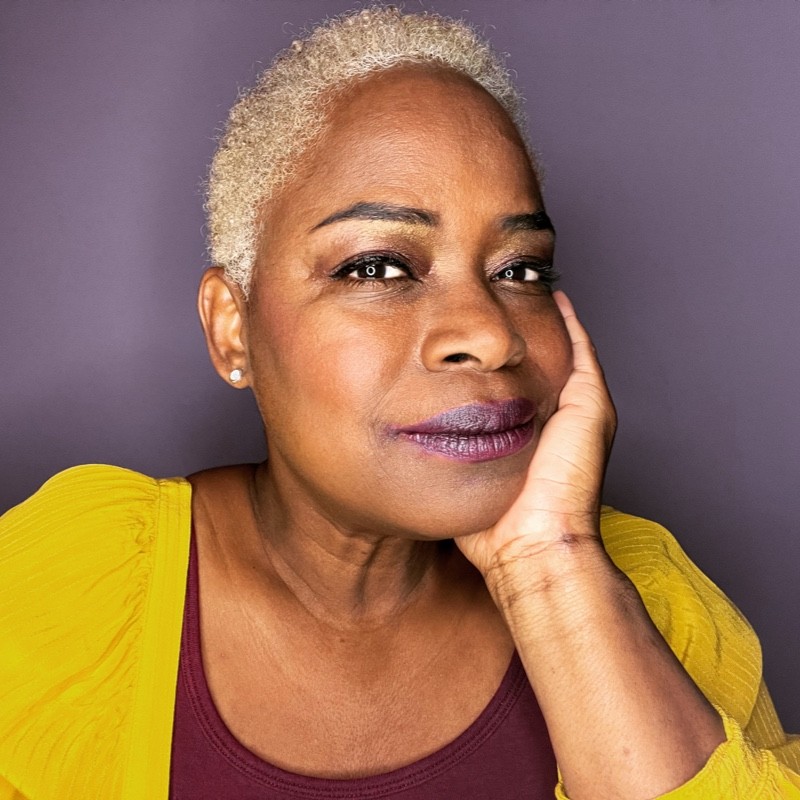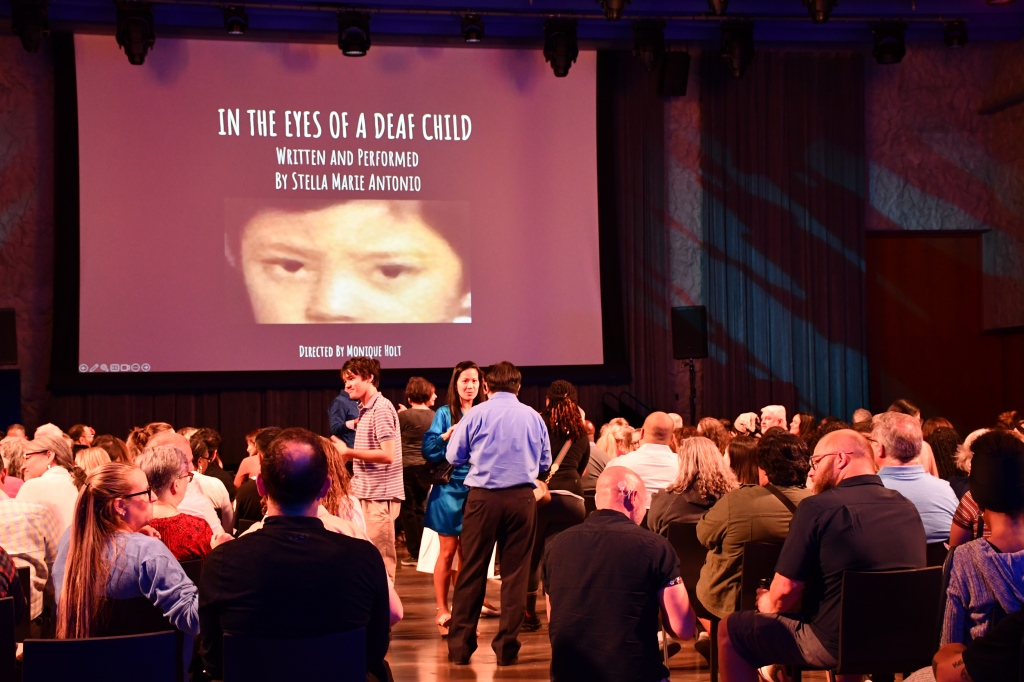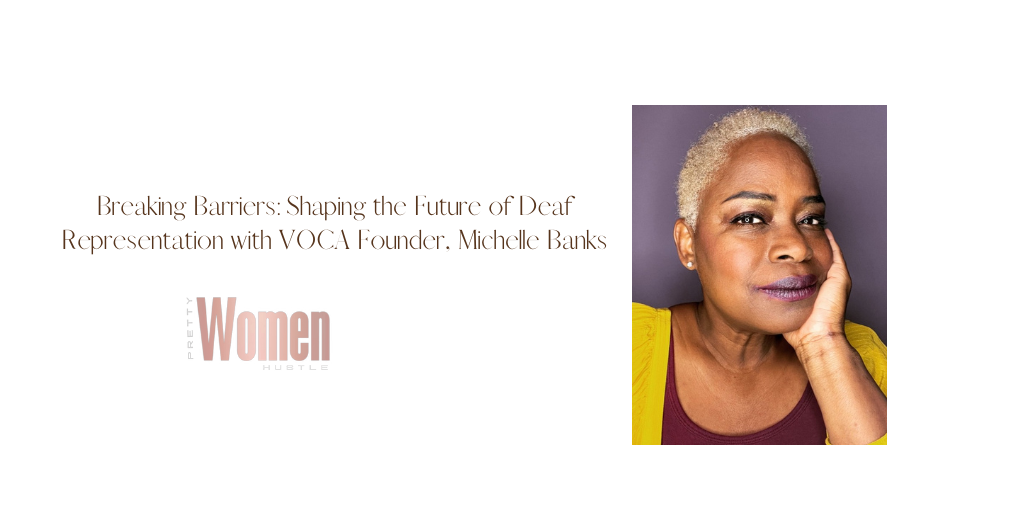Washington, DC Native, Michelle Banks is an award-winning actress, writer, director, and producer. The Artistic Director and Co-Founder of Visionaries of the Creative Arts (VOCA). With an extensive professional acting career that includes appearances includes Girlfriends, Soul Food Series, and more. Directing shows such as Camellia for Camille (Def Spotlight’s Short Play Festival), Broadway’s For Colored Girls, and A Raisin in the Sun (Gallaudet University) to name a few.
Speaking with Michelle Banks via Q&A I was able to find out more about what inspired the founding of Visionaries of the Creative Arts (VOCA).

Can you share with us the inspiration behind founding Visionaries of the Creative Arts (VOCA)?
When I directed a play, A Raisin in the Sun with the Black Deaf cast, at Gallaudet University in 2018, I realized I had tapped into an incredible talent base in the Black Deaf community. I saw the critical need to continue supporting the creative work of the Deaf and Hard-of-Hearing BIPOC artists after the production. I was inspired by the work of these talented artists and wanted to give something back to the community. These artists and so many other Deaf BIPOC artists were not getting the exposure they deserved. They needed access to resources to help advance their talents as performing artists. I shared this vision with Nayte Paxton, the director of voice performers in A Raisin in the Sun, and we eagerly agreed to make the vision come true – the fruition of Visionaries of the Creative Arts (VOCA) in 2019.
What motivated you to create opportunities specifically for Deaf and Hard-of-Hearing BIPOC entertainers in the arts and culture sector?
The Deaf and Hard-of-Hearing BIPOC community, along with its exceptionally talented artists, has long endured a troubling lack of visibility both within mainstream society and even within the Deaf cultural sphere. This underrepresentation has not only been an unfortunate reality but a call to action. Experiencing this imbalance firsthand served as motivation for me to carve out a dedicated safe space within the arts landscape and increase the exposure of our profession to the arts community.

As a Deaf actress, writer, director, and producer, can you walk us through your personal journey in the entertainment industry?
I have been in the entertainment industry for over 35 years. I knew I wanted to be an actress when I first saw the movie Sounder, which the late Cicely Tyson was in. I was so intrigued by her strong presence in the film. Since then, I’ve been doing what I love – acting, directing, writing, and producing. I’ve acted onstage and onscreen, “Big River”, “For Colored Girls…”, ‘Girlfriends”, “Soul Food”, and “Compensation”. I also wrote and performed my one-woman show, “Reflections of a Black Deaf Woman”, and toured with it to various venues such as the Kennedy Center and The National Black Theater Festival. I’ve been directing more now and then. I actually enjoy the art of directing and working with creative artists, especially actors. In the past year, I worked as a Director of Artistic Director (DASL) for Olney Theatre Center’s “The Music Man” and for Broadway’s “For Colored Girls…”. The role of DASL involves sign language translations of the scripts and sharing knowledge of Deaf culture for stage, TV, and film. It is relatively new to the entertainment business.
My journey has facilitated my personal and professional growth as an artist. It has been instrumental in breaking barriers and paving the way for other Deaf and Hard-of-Hearing BIPOC artists in the entertainment industry.
How have your experiences shaped the mission and vision of VOCA?
My experiences in performing arts and running a previous theatre company in New York City, Onyx Theatre Company, have helped me prepare for a huge undertaking by establishing VOCA for the Deaf and Hard-of-Hearing BIPOC community. My experiences working with the artists have allowed me to witness inequitable access to work opportunities and resources in the industry. Therefore, the mission for VOCA was established to remove barriers to artistic excellence by providing an accessible visual platform for Deaf and Hard-of-Hearing (HoH) Black, Indigenous, and People of Color (BlPOC) to create, collaborate, and showcase our culturally distinct works through various forms of artistic and linguistic expression. VOCA’s vision is to be a global leader in providing equitable access and opportunities for Deaf and HoH BIPOC artists in the creative and performing arts arena.

Can you share some specific challenges you’ve encountered and overcome in establishing VOCA?
We experienced some challenges during the first two years of VOCA’s inception when the COVID-19 pandemic emerged in early 2020. Our first professional production, A Raisin in the Sun, was shut down in April 2020 and we couldn’t perform. Hence, we had to make necessary changes in our program by transitioning our live performance to virtual performance and panel discussions during the pandemic. It was a very successful turnout because VOCA unexpectedly received over 30,000 viewers. During the post-pandemic, we had our first live performance of ISM in December 2021 and we brought back the production of A Raisin in the Sun this summer 2023. Indeed, as VOCA continues to expand, we always need donors to help support the programming. We are seeking big donors to support our mission and be part of the vision. VOCA is now in its fifth season, and we are thriving more than ever!
Looking back at your journey and the impact of VOCA, what legacy do you hope to leave in the realm of Deaf representation in the arts?
My aspiration is to establish a lasting legacy as a trailblazer, someone who has fearlessly cleared pathways for Deaf and Hard-of-Hearing BIPOC artists to not only thrive in their respective industry professions but to become the vanguards of the next generation of Deaf leaders in the realm of entertainment arts. By breaking through these barriers, the goal is to create an enduring impact that extends far beyond my individual journey. Through my endeavors, I hope to inspire a paradigm shift, where Deaf and Hard-of-Hearing BIPOC artists are not anomalies but integral contributors and leaders in the evolution of entertainment arts. This legacy is about laying down a foundation upon which future generations can build, ensuring a more diverse, inclusive, and dynamic future for the world of entertainment.

About Visionaries of the Creative Arts (VOCA) was founded in 2019 with a mission to support and uplift Deaf and hard-of-hearing BIPOC artists who have long been underrepresented in mainstream and Deaf culture. Through their various productions and initiatives, VOCA aims to address social injustices and provide a platform for these artists to share their powerful stories.
